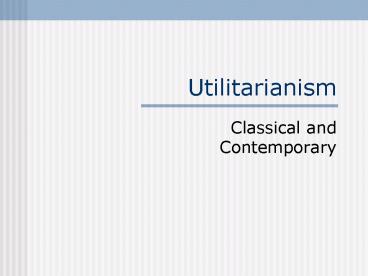Utilitarianism - PowerPoint PPT Presentation
1 / 18
Title:
Utilitarianism
Description:
Are ethical standards based on doing or being? Is the rightness of an action ... Propinquity. Fecundity. Purity. Extent. Classical Utilitarianism: Bentham ... – PowerPoint PPT presentation
Number of Views:1305
Avg rating:3.0/5.0
Title: Utilitarianism
1
Utilitarianism
- Classical and Contemporary
2
Utilitarianism and Fundamental Questions
- Is there a universal standard?
- If so, what is it and how do we know?
- What is the role of reason?
- Are ethical standards based on doing or being?
- Is the rightness of an action determined by the
action itself or its consequences? - Is ethics concerned with goals, purpose?
3
Utilitarianism and Fundamental Questions
- There is a universal standard, happiness or
pleasure - We can make a rational determination of that
standard by empirical means - The standard is based on goals, purposes and
- Is concerned with actions and value
- The consequences of an action determine rightness
4
Utilitarianism as Consequentialist
- The rightness of actions is determined by their
actual outcomes or consequences. - Right actions produce the greatest amount of good
possible among the available options maximizing
principle.
5
Utilitarianism as Universalist and Impartial
- Good consequences increase the welfare of
individuals - It does not matter who the individuals are
- Universalist must consider consequences for ALL
stakeholders - Impartial must consider consequences for ALL
stakeholders EQUALLY
6
Utility
- Actions have good and bad consequences
- Good minus bad utility
- One should choose action with greatest utility
- Greatest utility may equal
- Greatest net good
- Least net evil
7
Classical Utilitarianism
- Welfare is defined as happiness
- Happiness is defined as pleasure
- Not Aristotles definition of pleasure
- Hedonistic
- Pleasure includes physical, aesthetic, and
intellectual pleasure
8
Classical Utilitarianism
- Jeremy Bethams felicific calculus
- One can calculate the utility of an action by
- Assigning numerical value to units of pleasure
and pain that will result - Counting persons affected by each
- And considering the following dimensions of
pleasure or pain
9
Classical Utilitarianism Bentham
- Intensity
- Duration
- Likelihood
- Propinquity
- Fecundity
- Purity
- Extent
10
Classical Utilitarianism Bentham
- One must calculate the utility of all possible
actions and choose the one that maximizes the
good.
11
Classical Utilitarianism Mill
- John Stuart Mill sought to defend utilitarianism
against critics, who - called it a theory for pigs and
- found it much too complex for real use
- To do so, he made revisions to Benthams theory.
12
Classical Utilitarianism Mill
- Nothing in Bentham to prevent defining some
pleasures as more enduring, etc. - Mill made explicit that aesthetic and
intellectual pleasures are qualitatively superior
to physical pleasures - Thus, they have greater value in calculating
utility.
13
Classical Utilitarianism Mill
- Mills proof of the theory
- People desire happiness for its own sake.
- If something is desired for its own sake, it is
desirable. - If it is desirable, it is intrinsically good (by
definition).
14
Classical Utilitarianism Mill
- Each persons happiness is an intrinsic good.
- General happiness is good for people as a whole.
15
Classical Utilitarianism Mill
- Problem of complexity addressed by defining two
levels of moral thinking - Intuitive in most situations, follow rules of
commonsense morality - Critical when rules come into conflict, follow
principles of utility
16
Classical Utilitarianism
- Bentham and Mill
- The Industrial Revolution in England
- Social upheaval
- Urbanization
- Industrialization
17
Classical Utilitarianism
- Utilitarianism was useful in efforts to pass
legislation to meet the needs of the huge numbers
of people impacted by the upheaval - Limits on work day
- Limits on child labor in industry
- Education
- Public health
18
Contemporary Utilitarianism
- Are you a utilitarian?
- Did your answers to the questions suggest that
you tend to be utilitarian in your approach to
ethical issues? - What did you find most valuable about the theory?
- Most problematic or least valuable?






![❤️[READ]✔️ Utilitarianism PowerPoint PPT Presentation](https://s3.amazonaws.com/images.powershow.com/10049602.th0.jpg?_=20240607040)
![❤️[READ]✔️ Utilitarianism PowerPoint PPT Presentation](https://s3.amazonaws.com/images.powershow.com/10048778.th0.jpg?_=20240606019)























